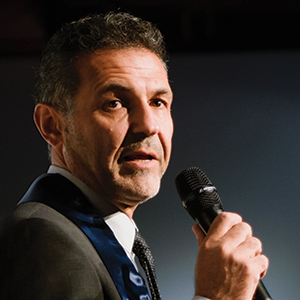

Last Saturday, the Tech Museum of Innovation officially rebranded its signature event, the Tech Awards, pivoting to a new concept called Tech for Global Good. Instead of a separate lavish gala banquet for hundreds of tuxedos and high rollers, the event now unfolds in museum spaces, giving attendees direct access to the award-winning laureates for extended periods of time.
The awards also now dovetail with the museum’s mission as a whole. High rollers were still present, but the tuxedos were not.
The James C. Morgan Global Humanitarian Award went to Khaled Hosseini, Independence High School graduate and author of The Kite Runner. He originally came to the U.S. as a war refugee from Afghanistan and now does extensive work as a goodwill ambassador to the U.N. refugee agency (UNHCR). Addressing the crowd, Hosseini said that his work jibes with that of the Tech for Global Good program. He’s inviting young people to feel part of a larger global community as they begin to inherit the world’s problems like refugees and climate change.
When it came to the laureates, instead of 10 people accepting their awards on stage, five laureates simultaneously answered questions in different areas of the museum. Attendees were allowed to choose which laureate they wanted to hear, and which ones they wanted to question. This took place for about 30 minutes, and giving attendees the time and space to interact with whichever laureate they wanted was a much more productive scenario than the previous Tech Awards, where laureates merely stood at cocktail tables before being mobbed by the crowd; they couldn’t really talk to people in a true Q&A fashion.
Each winning laureate now also receives his or her own dedicated installation in the museum, which is essentially a sit-down booth that plays an interactive video of the award-winning project. When I stopped by the day before the celebration, the booths were already up for the general public, and kids were glued to each video, actually paying attention to the stories. The videos will remain on display in the museum until the next Tech for Global Good celebration a year from now.
And when it came to the stories, the Tech Museum made sure to first fill everyone up with food and drinks before screening the documentary videos of the five award-winning projects. Each video was about four minutes long and each project was staggering in its degree of global influence and tear-jerking empathy.
As an example, Crisis Text Line is a nonprofit organization that enables anyone in crisis or pain to anonymously text with a trained counselor, absolutely free, 24/7. Depression, suicide, substance abuse, domestic violence, anxiety, bullying or any similar issue is addressed. Since texting is a private and quiet phenomenon, users don’t need to speak out loud or sneak off somewhere to call for advice in crisis situations. As of right now, Crisis Text Line has exchanged more than 45 million messages since 2013 and their work has led to the largest mental health data set that’s ever been collected and analyzed. After the video screening, founder Nancy Lublin was a total rock star during her presentation, elaborating on her funding process, the details of how the users remain anonymous via encryption, and how her goal is to help a billion people over the next dozen years.
The other four laureates shared similar stories. Josh Nesbit, CEO of Medic Mobile, was originally an undergraduate at Stanford who wanted to be a doctor. At age 19 he volunteered in Malawi and realized remote villages did not have regular access to community health workers, so he wound up providing mobile phone software to better connect them to hospitals. In India, Forus Health developed a machine to help eradicate preventable blindness, reaching more than 2 million people around the world. A Brazilian company called Livox similarly created a tablet computer to help disabled people communicate better. Headquartered in Seattle, PATH, an international health organization, is now facilitating vaccines in sub-Saharan Africa.
Even with a new rebranding, Tech for Global Good was still the righteous uplifting event I expected. Just being in the same room with motivated, ambitious, goal-driven people was downright inspiring. Maybe the world is salvageable after all.



